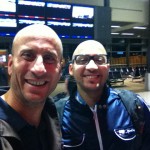On the road to SXSW and thinking about Latam startup investing
 I’m sitting here on the plane from Bogotá, Colombia to Atlanta, Georgia. What irony. I’m actually just stopping by, but it is amazing to think that I was born in Atlanta (I’m not going to divulge how long ago that was). I’m on my way to South by Southwest (SXSW), a large event for tecnology, film and music held in Austin, Texas. Among other things, I’ll be moderating a panel about the investment and startup environment in Colombia.
I’m sitting here on the plane from Bogotá, Colombia to Atlanta, Georgia. What irony. I’m actually just stopping by, but it is amazing to think that I was born in Atlanta (I’m not going to divulge how long ago that was). I’m on my way to South by Southwest (SXSW), a large event for tecnology, film and music held in Austin, Texas. Among other things, I’ll be moderating a panel about the investment and startup environment in Colombia.
As the picture on the left shows, already on the way, I began meeting interesting people. In this case, it’s Kelvyn Santos, aka, Kashmir Hip Hop, an exec at a multinational ad agency in the Domincan Republic and a part time Hip Hop artist.
Thinking about the topic of startup investing in Latin America, if I take the position of devil’s advocate, it’s not hard to see the excellent opportunities for investing in basic things like infrastructure projects, natural resources (e.g., oil, gas, gold, coal, agriculture, etc.). Even real estate, I believe, continues to promise top notch medium and long term returns.
For regional and local investors, these types of investments have the advantage of familiarity and relatively well-known risk levels. Even in terms of size of returns, as a whole, these traditional investments will probably generate one and more probably two orders of magnitude of the total amounts than startups will generate.
Investing in Latin American startups, I believe, holds the greatest attraction for two types of investors: 1) those looking to allocate millions rather than hundreds of millions of dollars to investment funds and 2) those who understand the space well enough and who truly enjoy investing in innovation and are interested in putting their knowledge and expertise to work in emerging markets.
If I would continue to play devil’s advocate, I’d really have to find a way to convince potential investors that they should pass up opportunities to invest in the next opportunity with hundreds of millions of dollars or billions of dollars in value (Buscapé and Mercado Libre, respectively). Additionally, I’d have to come up with a reason not to look for companies who found quick and relatively lucrative exits, such as Clan Descuento and Three Melons or for the next OLX, Mentez and Vostu with large follow-on investments.
So I guess I’m answering my own question. In general, there are opportunities all across Latin America and, realistically, Colombia is getting into the game a bit late. Thus, I think the best way to look at this is to see the general Latin American landscape as a region with interesting opportunities with Colombia being a part of the whole.
So, instead of singling out Colombia as presenting more opportunities, I think it’s more relevant as part of the general Latin America startup story, which, in turn is part of the larger emerging market story. One only needs to look at the influence that funds such as Tencent and DST (both of which came from emerging markets) have in order to understand that powerhouse investment firms can come from other parts of the world besides the states.
The other day, I was talking about this with a reporter from a major US magazine who was curious about this phenomenon. That article should come out in about a month (I’ll keep you posted), but my thesis was that emerging market investments are sometimes worthy of Warren Buffet’s epithet of “moat” investments.
This is the reasoning that Buffet uses to justify investments in state furniture and jewelry stores. These franchises are firmly established in a geographical niche. First of all, they are hard to establish and, even more importantly, they are harder to topple. Similarly, emerging market firms such as Tencent and DST so thoroughly dominate their geographic markets (I’m talking of the startups that spawned the investment divisions), that they develop “moat” economics particularly in terms of steady and attractive margins.
In Latin America, I’d say two firms are great examples of this: 1) Buscape/Naspers and 2) Mercado Libre. If nothing else, those two firms, in addition to hedge funds and VCs already active in the region, provide valid exit options for startups.
Ok. That’s enough philosophizing (anyway the flight attendant is refusing to give me any more wine for inspiration). What do you think? What have a missed? How off the mark am I? Remember, I reserve the right to mention your comment and username during the panel. 



